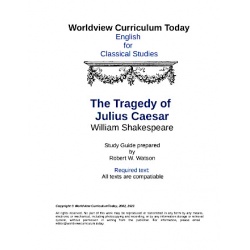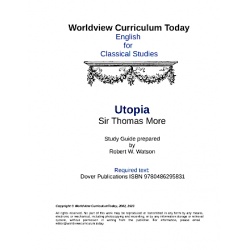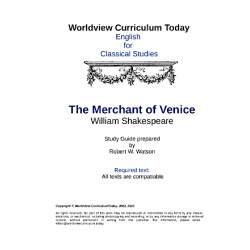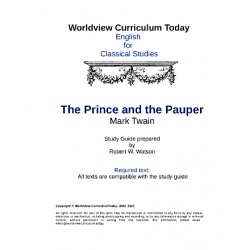Medieval and Early Renaissance Literature
The Tragedy of Julius Caesar
Order text here
Note: This guide is included in the course, A Survey of World Literature.
This is Shakespeare's great work relating the end of Julius Caesar's life and the civil war that followed. Caesar was a first-class politician who was not above by-passing the Roman Senate if it suited his political ambitions. However, Caesar pushes the the Senate a bit too much, leaving many to believe that there was no choice but to kill Caesar. One can argue that Caesar represents the beginning of the Roman empire.
Note: This guide is included in the course, A Survey of World Literature.
This is Shakespeare's great work relating the end of Julius Caesar's life and the civil war that followed. Caesar was a first-class politician who was not above by-passing the Roman Senate if it suited his political ambitions. However, Caesar pushes the the Senate a bit too much, leaving many to believe that there was no choice but to kill Caesar. One can argue that Caesar represents the beginning of the Roman empire.
Number of lessons: 5; compatible text for study guide: all texts are compatible (you may order the text below). Guide prepared by Robert W. Watson.
Utopia
Order text here
Note: This guide is included in the course, A Survey of British Literature.
The word utopia was created by Sir Thomas More. Utopia comes from two Greek words, ou and topos, which mean literally, “no place.” As you read Utopia, you will agree that the land described by More is truly no place that any person has ever known. Yet, it has been the mark not only of early American history, but of recent times as well, that many idealists experimented with creating ideal societies, all ending in failure. Whether completely separating oneself in a closed community like monasteries or in communes where everyone shared in all production and benefits, utopianism is based on a false foundation, the defects of this foundation being discussed more fully in this guide with the various notes.
Note: This guide is included in the course, A Survey of British Literature.
The word utopia was created by Sir Thomas More. Utopia comes from two Greek words, ou and topos, which mean literally, “no place.” As you read Utopia, you will agree that the land described by More is truly no place that any person has ever known. Yet, it has been the mark not only of early American history, but of recent times as well, that many idealists experimented with creating ideal societies, all ending in failure. Whether completely separating oneself in a closed community like monasteries or in communes where everyone shared in all production and benefits, utopianism is based on a false foundation, the defects of this foundation being discussed more fully in this guide with the various notes.
Number of lessons: 10; compatible text for study guide: Dover Publications ISBN 0486295834 (you may order the text below). Guide prepared by Robert W. Watson.
The Merchant of Venice
Order text here
Note: This guide is included in the course, An Introduction to Literature.
Even though The Merchant of Venice is often considered broadly as a comedy, it is actually a tragicomedy. This play has a combination of tragic and comic elements with the mixing of lower-class and upper-class characters. The plot basically has the impending doom of a very noble character, yet unlike the traditional tragedy, has a happy ending for all involved. One could argue that even Shylock is better off by learning about mercy and being forced to reform himself.
Plenty of suspense is found in this play. You will discover that this play offers a good study in prejudice, love, and hatred. Also, you will be putting your knowledge of Greek and Roman mythology to the test. The Merchant of Venice is replete with allusions to mythology. So, enjoy yourself as you mingle with the merchants and nobles in Venice and as you try to solve the riddle of the three caskets.
Note: This guide is included in the course, An Introduction to Literature.
Even though The Merchant of Venice is often considered broadly as a comedy, it is actually a tragicomedy. This play has a combination of tragic and comic elements with the mixing of lower-class and upper-class characters. The plot basically has the impending doom of a very noble character, yet unlike the traditional tragedy, has a happy ending for all involved. One could argue that even Shylock is better off by learning about mercy and being forced to reform himself.
Plenty of suspense is found in this play. You will discover that this play offers a good study in prejudice, love, and hatred. Also, you will be putting your knowledge of Greek and Roman mythology to the test. The Merchant of Venice is replete with allusions to mythology. So, enjoy yourself as you mingle with the merchants and nobles in Venice and as you try to solve the riddle of the three caskets.
Number of lessons: 5; compatible text for study guide: all texts are compatible (you may order the text below). Guide prepared by Robert W. Watson.
The Prince and the Pauper
Order text here
Note: This guide is included in the course, An Introduction to Literature.
Almost every commentator suggests that Mark Twain wrote The Prince and the Pauper as a children’s book in order to gain a younger audience. However, it is dif icult to believe that Twain would write a historical novel merely to entertain young people. Like most authors, Twain wrote with purpose. On the surface, the story appears to be a delightful tale about two boys switching roles by accident. But much deeper are the philosophical and social beliefs which Twain was challenging.
Through The Prince and the Pauper, Twain is clearly attacking two social institutions: one political and the other legal. Twain ridicules the political doctrine of the “divine right of kings”; yet, he is able to do so in an inoffensive manner. While many today laugh at this doctrine, even in Twain’s day, this political idea was no longer taken seriously by most nations.
However, the use of capital punishment for petty crimes was very much in place, not only in England, but in the United States as well. Also, the conditions of prisons as described in the story was not far removed from the prisons in nineteenth‐century America. As you read this tale, notice how Twain succeeds by making the legal system to appear grossly unjust by anyone’s standards.
Note: This guide is included in the course, An Introduction to Literature.
Almost every commentator suggests that Mark Twain wrote The Prince and the Pauper as a children’s book in order to gain a younger audience. However, it is dif icult to believe that Twain would write a historical novel merely to entertain young people. Like most authors, Twain wrote with purpose. On the surface, the story appears to be a delightful tale about two boys switching roles by accident. But much deeper are the philosophical and social beliefs which Twain was challenging.
Through The Prince and the Pauper, Twain is clearly attacking two social institutions: one political and the other legal. Twain ridicules the political doctrine of the “divine right of kings”; yet, he is able to do so in an inoffensive manner. While many today laugh at this doctrine, even in Twain’s day, this political idea was no longer taken seriously by most nations.
However, the use of capital punishment for petty crimes was very much in place, not only in England, but in the United States as well. Also, the conditions of prisons as described in the story was not far removed from the prisons in nineteenth‐century America. As you read this tale, notice how Twain succeeds by making the legal system to appear grossly unjust by anyone’s standards.
Number of lessons: 14; compatible text for study guide: all texts are compatible (you may order the text below). Guide prepared by Robert W. Watson.
- 1




